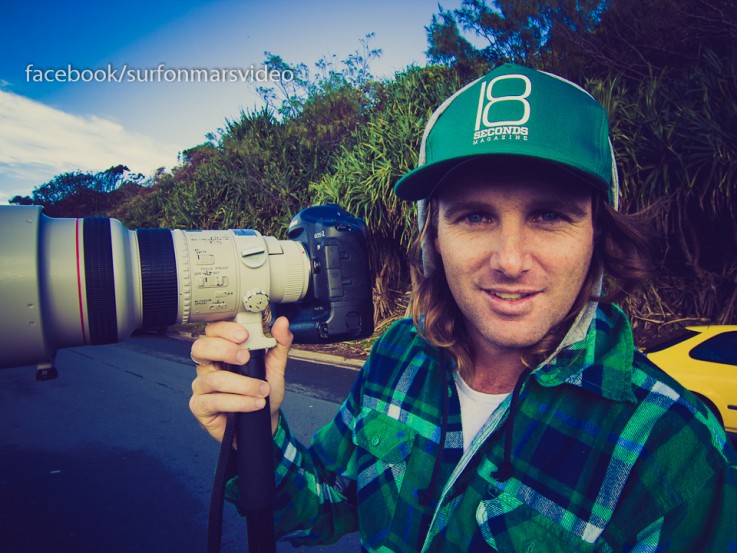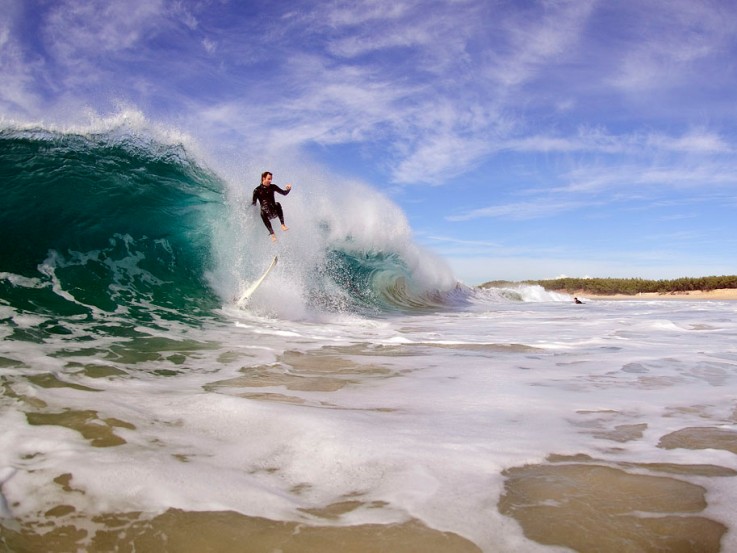Andy Morris - 18Seconds
What was your first board?
I got my hands on one when I was about eight-years-old. It was a foamie, but not like the ones these days. It was four or five inches thick and had a big single fin. I remember the blue mesh covering the foam on the deck became stretched and loose from so much grom-froth. I used to ride it down at the Somers’ rivermouth (Mornington Peninsular, Victoria) every school holidays. It’s a perfect place to learn about the ocean because it’s not exposed to too much swell and the waves break softly along angled sandbars – it was a great board to snap-up on too!
What do you love about surfing?
So many things. When I first started surfing I loved the feeling of the wave pushing me along. I remember a holiday to the Gold Coast when I was learning about surfing. My parents hired a board for an hour or so in Surfers Paradise. I remember the surf was closing out on the outside bank into a little reform. After 25 years I still remember one wave very clearly. I paddled for a wall of whitewater about one-foot high! It picked me up and about halfway to the beach a wave from behind caught up, causing my wave to double-up. I felt the energy of the wave pick me up, just like when I’d first got on. Just that simple act of being stoked twice on one ride did it. I was hooked after this wave.
These days I love the anticipation of new swells, the unknown factor, seeking out sandbanks in more remote areas. Life’s pretty busy at the moment, so surfing is an escape back to simple pleasures… and to clear my mind.
What is your favourite surfspot?
I don’t really have one. Growing up in Victoria my favourite beachie was Powlett River: it’s been compared to Pipe/Backdoor, but just on a smaller scale. I’ve had some of the best surfs of my life there. My favourite point was Winkipop in Torquay. These days on the Gold Coast, when out the front of my house turns on (beachbreak we call ‘The Office’) it can be as good as anywhere without the crowds. I like all the main points on the Gold Coast – generally surf Burleigh Point the most. My favourite is whichever one has the best sand, when all roads lead to the points. Soon as I cross the border into northern New South Wales, which I do all the time, I have a whole other bunch of favourite spots!
Who influenced you when you were growing up?
Definitely my Dad. Between the ages 14-18, my old man was the only dad out of my surfing mates who regularly drove the 1.25 hours (one way) to Victoria’s ocean beaches. Either Phillip Island, Torquay or the Morning Peninsular depending on swell/winds conditions. He rode a big nine-foot-something mal and I think deep down, the coastal escape was something he enjoyed as much as I did (he was a banker). During daylight saving months, if the wind was northeast late in the day, we even use to bolt down to Woolamai (Phillip Island swell magnet) mid-week. If it wasn’t for him I don’t think I’d be doing this interview. I’m forever grateful he took me surfing, despite the lack of ‘ease’ or ‘convenience’ to the coast.
Who influenced / inspired you the most in your career?
Well again my old man with certain aspects. He is a savvy businessman and is always there for his opinion on the financial side of things. My fiancé, Alicia inspires me with her creativity and can do attitude. She has amazing work ethic, which has rubbed off on me. Tim Fisher, my editor at Surfing Life magazine was my first boss in the publishing industry and was a great mentor. There have been many people along the way who have influenced me in same shape or form.
Who are some of the people you are taking notice of today?
There are a bunch of young photographers that have grabbed my attention over the last couple of months. It’s exciting to see young talent coming through. Same with filmers. Basically, taking notice and have alot of respect for people doing their own thing in surfing.
What sort of education have you had?
I went to Scotch College in Melbourne. It’s an all-boys private school with a very academic reputation. I kinda broke the mold of career expectations: the suit and tie. I wore them for nearly five years before following my passion and building a career out of it.
What was your very first job?
I used to help the old lady next door with her gardening. I was about 15 – she paid well.
What is 18seconds? And why did you start it?
18seconds is a powerful and much sort-after swell period! It’s also the name of a digital surfing magazine, which can be viewed on all devices (desktop and mobile). We aim to combine rich media and interactivity, by bringing surfing from around the world.
To elaborate... we are all about surf. We thrive on it, froth on it and occasionally get into our car for it… before sunrise. Seriously. Escapism, real surfers, pro surfers, exotic destinations, unseasonal swells, novelty lineups, good times, etc. are what you find in 18seconds – a collection of special experiences that make surfing so friggin’ excellent.
I started it to make something different from print, particularly as technology was, and still is, evolving. Surfing is dynamic and lends itself to powerful imagery and motion. We combine the two into a modernised layout.
I also started because of a passion. And having acquired a bunch of qualifications/experience/knowledge, to open the surf-publishing door. It’s funny now I think about it. At certain times in my career I sometimes thought, why am I doing this job? It all makes sense now.
Also, I didn’t want to go back to the nine-to-five city grind working for the man.
What does your job involve on a day-to-day basis?
Day-to-day it varies a lot. Some days I’m liaising with contributors: photographers, writers, filmers. Organising shoots. Organising surfers. Other days I’m purely editing copy, and writing stories. Some days I’ll be taking photos. Others I’ll be downloading images and colour correcting them. Then there are admin days: paying invoices, general account keeping stuff. Every day there are social media posts. Other days I’ll be talking with clients and actioning requests and generating, and seeking out new sponsorship agreements/opportunities. And then sneaking in a surf when the conditions are right.
What are the main challenges you face in your work?
I haven’t been on a holiday for three years. My workload is heavy and adhering to material deadlines can be tricky at times – I’m dealing with a lot of contributors and surfers who don’t always stick to dates. The there’s the ocean - organising editorial trips around swell can be challenging even with the forecasting tools these days – even though you know what days will be firing, it’s more about riders’ availability.
Financially we run a tight ship. There are advertising dollars but they are harder to come by these days. If I had an advertiser for every photographer/writer/filmer who contacted us wanting work!!! From the start we set out to do the right thing by our contributors – that is, pay them for their work. Unfortunately alot of start-up and existing sites/mags don’t do this, using the whole, pay you in exposure angle. That doesn’t pay their bills or put food on their plates. We all work to be paid, so why treat them indifferently?
Then there’s the whole, ‘surfing magazines and the slow march into oblivion’ idea as Swellnet put it. I’ve been meaning to thank them for saving us thousands in focus groups! From what I took out of it, we as a digital version available across all desktop and mobile devices, with engaging editorial not swayed by advertisers and loyal readership measured down to the oneth person, are in a good position moving forward.
One thing I’ve learnt in publishing, is you can’t please everyone. That’s the key to failure. Challenges come from every angle – you need thick skin to survive.
What advice would you give to someone wanting to get into the surf publishing industry?
If you’re doing it to surf more often, then you’re doing it for the wrong reasons – there are much better jobs for surfers. If you get a foot-in, be prepared to work your arse off for little reward from publishers: because if you’re not cutting it, there’s a long line of talented people behind you. That’s not how we operate business, that’s just from experience working in the surf industry. Bottom line: whatever happens, stay positive and happy.
Tell us about your career path. What are some of the jobs you’ve had and the companies you’ve worked for?
After Uni, the first full-time job was at Natural Beauty Care manufacturing body lotions, shower gels, moisturisers, bath salts etc. when I was 21. I was the compounder who melted all the ingredients down in large 1000 litre vats. This job was basically to acquire annual leave and fund overseas surf trips! Then I worked at Surf Dive ‘n’ Ski surf shops as a retail assistant. Then straight into advertising agency, Singleton Ogilvy and Mather on the Myer account. A couple of years later I jumped ship to Clemenger BBDO (another ad agency) on the Chrysler Group (Jeep, Chrysler and Dodge cars). I then moved to the Gold Coast to take up a role as the assistant editor of Australia’s Surfing Life Magazine. After that I freelanced for websites like Surfline, ESPN. Then started 18seconds Magazine.
What do you like most about your job?
I like the freedom of running my own business. I like the creation process of the magazine. I like the fact my job is all about surf.
And then there are moments like these…
We recently published issue 16, which had a feature on Bells – we ran a couple of great shots from a kid named Harrison Dancaster. Shortly after publishing he sent me an email basically saying how stoked he was with his first run of images in a magazine and thanks for making it happen. That puts a smile on my face. And then Jake Donlen from Runamuk Visuals emailed me saying he was having a shit one until he received issue 16… “It wiped away all the bullshit,” he wrote.
Where can we find you online?
| Web: | www.18seconds.com.au |
| Facebook: | facebook.com/18secondsMagazine |
| Instagram: | 18secondsmag |
| Twitter: | @18secondsmag |
Posted by: Troy Roennfeldt, on May 9, 2013
Categories: Interviews
Latest Posts
Craig Sims - White Horses & Surfing Life Publisher
Luke Kennedy - Editor of Tracks Magazine
Simon ‘Swilly’ Williams - Surf Photographer
Jarra Campbell - the Bondi Alchemist
Greg Gordon - Owner of CR Surf
Shayne Nienaber - Surf Photographer
Alexa Hohenberg - Owner of Still Stoked
Christine Deveney - TapaReef Owner & Creator
Russell Ord - Surf Photographer
Richard Kotch - Surf Photographer
Categories
Interviews
Articles
Videos
Press Releases
Quiz
Archive
December 2018
November 2018
October 2018
September 2018
August 2018
July 2018
June 2018
May 2018
April 2018
March 2018
February 2018
January 2018
November 2017
January 2017
December 2016
November 2016
October 2016
September 2016
August 2016
July 2016
June 2016
May 2016
April 2016
March 2016
February 2016
January 2016
December 2015
November 2015
October 2015
September 2015
August 2015
July 2015
June 2015
May 2015
April 2015
March 2015
February 2015
January 2015
December 2014
November 2014
October 2014
September 2014
August 2014
July 2014
June 2014
May 2014
April 2014
March 2014
February 2014
January 2014
December 2013
November 2013
October 2013
September 2013
August 2013
July 2013
June 2013
May 2013
April 2013
March 2013










